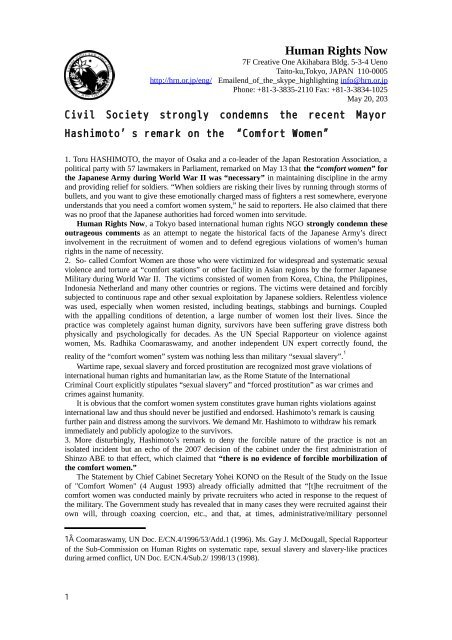Comfort Women Statement English version.pdf
Comfort Women Statement English version.pdf
Comfort Women Statement English version.pdf
Create successful ePaper yourself
Turn your PDF publications into a flip-book with our unique Google optimized e-Paper software.
Human Rights Now7F Creative One Akihabara Bldg. 5-3-4 UenoTaito-ku,Tokyo, JAPAN 110-0005http://hrn.or.jp/eng/ Emailend_of_the_skype_highlighting info@hrn.or.jpPhone: +81-3-3835-2110 Fax: +81-3-3834-1025May 20, 203Civil Society strongly condemns the recent MayorHashimoto’s remark on the “<strong>Comfort</strong> <strong>Women</strong>”1. Toru HASHIMOTO, the mayor of Osaka and a co-leader of the Japan Restoration Association, apolitical party with 57 lawmakers in Parliament, remarked on May 13 that the “comfort women” forthe Japanese Army during World War II was “necessary” in maintaining discipline in the armyand providing relief for soldiers. “When soldiers are risking their lives by running through storms ofbullets, and you want to give these emotionally charged mass of fighters a rest somewhere, everyoneunderstands that you need a comfort women system,” he said to reporters. He also claimed that therewas no proof that the Japanese authorities had forced women into servitude.Human Rights Now, a Tokyo based international human rights NGO strongly condemn theseoutrageous comments as an attempt to negate the historical facts of the Japanese Army’s directinvolvement in the recruitment of women and to defend egregious violations of women’s humanrights in the name of necessity.2. So- called <strong>Comfort</strong> <strong>Women</strong> are those who were victimized for widespread and systematic sexualviolence and torture at “comfort stations” or other facility in Asian regions by the former JapaneseMilitary during World War II. The victims consisted of women from Korea, China, the Philippines,Indonesia Netherland and many other countries or regions. The victims were detained and forciblysubjected to continuous rape and other sexual exploitation by Japanese soldiers. Relentless violencewas used, especially when women resisted, including beatings, stabbings and burnings. Coupledwith the appalling conditions of detention, a large number of women lost their lives. Since thepractice was completely against human dignity, survivors have been suffering grave distress bothphysically and psychologically for decades. As the UN Special Rapporteur on violence againstwomen, Ms. Radhika Coomaraswamy, and another independent UN expert correctly found, thereality of the “comfort women” system was nothing less than military “sexual slavery”. 1Wartime rape, sexual slavery and forced prostitution are recognized most grave violations ofinternational human rights and humanitarian law, as the Rome Statute of the InternationalCriminal Court explicitly stipulates “sexual slavery” and “forced prostitution” as war crimes andcrimes against humanity.It is obvious that the comfort women system constitutes grave human rights violations againstinternational law and thus should never be justified and endorsed. Hashimoto’s remark is causingfurther pain and distress among the survivors. We demand Mr. Hashimoto to withdraw his remarkimmediately and publicly apologize to the survivors.3. More disturbingly, Hashimoto’s remark to deny the forcible nature of the practice is not anisolated incident but an echo of the 2007 decision of the cabinet under the first administration ofShinzo ABE to that effect, which claimed that “there is no evidence of forcible morbilization ofthe comfort women.”The <strong>Statement</strong> by Chief Cabinet Secretary Yohei KONO on the Result of the Study on the Issueof "<strong>Comfort</strong> <strong>Women</strong>" (4 August 1993) already officially admitted that “[t]he recruitment of thecomfort women was conducted mainly by private recruiters who acted in response to the request ofthe military. The Government study has revealed that in many cases they were recruited against theirown will, through coaxing coercion, etc., and that, at times, administrative/military personnel1Ȁ Coomaraswamy, UN Doc. E/CN.4/1996/53/Add.1 (1996). Ms. Gay J. McDougall, Special Rapporteurof the Sub-Commission on Human Rights on systematic rape, sexual slavery and slavery-like practicesduring armed conflict, UN Doc. E/CN.4/Sub.2/ 1998/13 (1998).1
directly took part in the recruitments.” A number of court judgments in Japan also clearly found theforcible nature of the practice of comfort women. In addition, many survivors and witnesses testifiedto the <strong>Women</strong>’s International War Crimes Tribunal that they were enslaved by abduction or othertypes force, including official conscription, arrest, intimidation by soldiers, violence. 2 There are nogrounds whatsoever to deny the forcible nature of the comfort women practice.Despite the gravity of human rights violations, Japan has failed to provide effective remedy,including compensation, official apology or satisfactory measures to the survivors, and the ABEadministration even attempted to deny the forcible nature of the practice by maintaining and publiclystating the abovementioned 2007 cabinet decision. Such an attitude has been widely criticized byUN human rights bodies such as the Human Rights Committee, CEDAW and CAT as well as theHuman Rights Council UPR working groups.A public disclosure of the truth and a public apology, including an acknowledgment of the facts,is especially crucial for the victims of the “comfort women” system whose sufferings have beenunduly neglected for decades. 3Therefore, we demand that the Japan government officially condemn the remark made by Mr.Hashimoto and unequivocally reaffirm that fact that the comfort women practice was forcible innature and constituted grave human rights violations. (End)This statement is open for endorsement of NGOs. If your NGO wishes to co-sign, please contact us via email.2Ȁ Judgment, The <strong>Women</strong>’s International War Crimes Tribunal for the Trial of Japan’s Military SexualSlavery, Case No. PT-2000-1-T, 31 January 2002. See also “ ‘Ianhu’ 100 nin no Shōgen”, DAYS JAPAN,vol.4, No.6, June 2007 (“Testimonies of 100 ‘<strong>Comfort</strong> <strong>Women</strong>’ ”, containing names and pictures ofsurvivors from South Korea, North Korea, China, Philippines, Taiwan, Indonesia, Malaysia, Japan, theNetherlands, and East Timor on).3Ȁ See Basic Principles and Guidelines in the Right to a Remedy and Reparation for Victims of GrossViolations of International Human Rights Law and Serious Violations of International Humanitarian Law,adopted by the Commission on Human Rights in 2005, UN Doc. E/CN.4/RES/2005/35 (affirming suchremedies for victims of gross violations of international human rights).2


